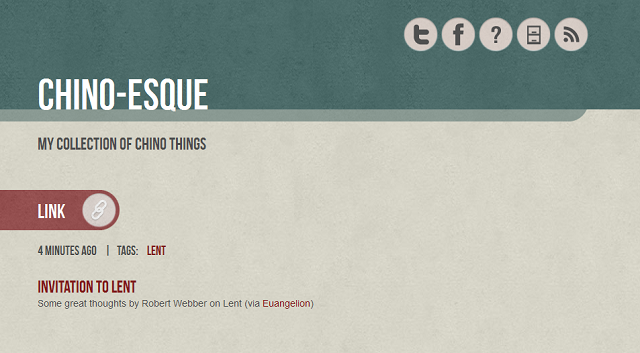 I receive a publication called The Regent World aimed at communicating with friends of Regent College, a seminary in Vancouver, British Columbia. Each edition is themed around a particular idea or issue. Various faculty, students, and alumni weigh in on the topic and it is generally good stuff. This latest go around took a look at social media.
I receive a publication called The Regent World aimed at communicating with friends of Regent College, a seminary in Vancouver, British Columbia. Each edition is themed around a particular idea or issue. Various faculty, students, and alumni weigh in on the topic and it is generally good stuff. This latest go around took a look at social media.
One contributor in particular, Conrade Yap, shared some thoughts that seemed soaked with wisdom.
Social media can be a bridge as well as a barrier. While it can bring people from afar closer together, it can also create distance between people in close proximity. For example, we can joyfully interact with a friend on Skype halfway around the world, and alienate the friend sitting just next to us at the same table. The key guideline I have about social media is this: “Manage social media before it manages you.” For me, one way to do that is to practice a technological Sabbath once a week. From 6pm Saturday to 6pm Sunday, I shut my computers down. Strangely, when that happens, I am free to see that life is bigger than an Internet connection. I am free to let technology be technology. I am free to let me be me, and let God be God.
The technology Sabbath he suggests might be too much or not enough for you, but I think there is a question worth asking…
Is there any time in our week when we aren’t “connected?”
Bobby and I were lamenting that during our time with students, they were so preoccupied with their phones (and no they weren’t just looking up Bible passages) that they didn’t seem like they were really able to engage what was happening in room. They were missing out on connecting with the people standing in front of them or sitting around them. They were there, but they weren’t. So on a whim, we just asked them if they wouldn’t mind setting their phone aside (actually, on a table in the back of the room) for the duration of our time together. Not because either of us think phones are bad, but because they can be distracting. We felt like them being willing to do that was as much symbolic as practical. Students can get distracted pretty easily – phone or no phone. But parting with their phones – even for an hour – is a non-verbal way of saying, “I’m here. Really here.”
I was sort of surprised that there wasn’t more whining and pushback. I thought the students would get all irate and even say, “forget this blankity-blank place, I’m out.” Instead, they seemed to embrace the idea. No “I’m outta here’s.” No whining. Just a willing – maybe even eager – compliance. And what started as just sort of a fleeing idea has grown. The next week, we mentioned it again and they deposited their phones on the table in no time at all. And then last week, before anyone had said anything, there were at least a dozen phones (curiously, most of them iPhones) taking a break from their masters.
Maybe students aren’t as committed to their technology as we are sometimes led to believe. Maybe something in them recognizes that being constantly “connected” isn’t good for them. Maybe they are longing for more than just a webpage that tells them how many “friends” they have. Maybe there is hope for them yet.
And if there is hope for them, then maybe there is hope for us.
More of Conrade Yap HERE.
The Regent World publication on social media HERE.

